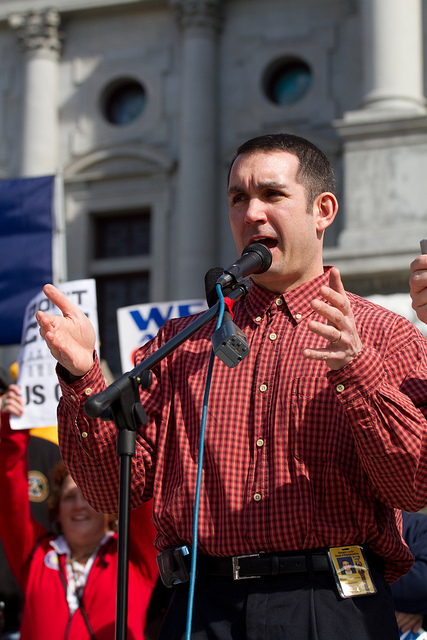
Pennsylvania Auditor General Eugene DePasquale has been vocal in the past about his desire for the state’s pension systems to decrease their allocations to hedge funds.
He doubled-down and expanded on that stance Thursday, saying the state-level pension funds’ risk appetite needs to be “dramatically pulled back”.
He also called on the pension systems to reduce investment fees and change funding models.
DePasquale made these announcements after examining the pension system of Montgomery County, which uses a low-cost investment approach that includes investing heavily in passive index funds. The approach represents a stark contrast with the state-level pension systems.
Montgomery County Commissioners Josh Shapiro explains how his county’s pension fund operates:
Historically the county invested money from the pension fund with Wall Street money managers, Shapiro explained.
“What we found was that they just were simply not getting the returns our retirees needed,” Shapiro said. “We, as a pension board, worked hard at looking at different models of funding our pension system that would work better than what we historically had.”
Shapiro said the county began investing 90 percent of the fund in Vanguard two years ago and has since has seen a return of 16.23 percent while saving more than over $1 million in fees.
“We knew we were creating a template that could be used by other municipalities and maybe even by the state,” Castor said. “The obligation that we have to our retirees is to make sure the funding is there today, tomorrow and 40 years from now. The health of that plan is part of the covenant we have with the people who do the work here at Montgomery County and at the state.”
DePasquale then suggested that the state-level pension systems could learn from the successes of Montgomery County, according to the Times-Herald:
DePasquale said the state needs to emulate Montgomery County, where the pension funds are invested in a stock index fund.
“Before you get there we have to reduce our exposure into the hedge fund area,” he said.
According to DePasquale, the public school retirement system has 10 percent of its investments in hedge funds, while the state employee retirement system has approximately 6 percent of investments in hedge funds.
“That risk needs to be dramatically pulled back,” DePasquale said.
A final point DePasquale made about the state pension system is that the fees going to private equity and hedge fund managers need to be reduced.
“Pennsylvania is a large state,” he said. “We have a huge leverage tool in the amount of money that we have in our pension system. For some reason our Public School Employment Retirement System and our State Employment Retirement System refuses to use that leverage to negotiate lower fees.”
This isn’t the first time DePasquale has asked the state’s pension funds to pull back from hedge funds.
That led pension officials to defend their hedge fund investments. The chairman of the Pennsylvania’s State Employees Retirement System board of trustees said this in September:
Industry experts generally agree that while hedge funds are not for every pension system, the unique needs of each system must shape their individual asset allocation and strategic investment plans. Therefore, the actions taken by one system may not be appropriate for all systems. Investors need to consider many factors including their assets, liabilities, funding history, cash flow needs, and risk profile.
[…]
To date, the strategy has been working. As of June 30, 2014, our diversifying assets portfolio, or hedge funds, made up approximately 6.2 percent of the total $28 billion fund, or approximately $1.7 billion. In 2013, that portfolio earned 11.2 percent or $197 million, after deducting fees of $14.8 million, while dampening the volatility of the fund. That performance helped the total fund earn 13.6 percent net of fees in 2013, adding more than $1.6 billion to the fund.
Read more Pension360 coverage of Pennsylvania pensions here.
Photo by Paul Weaver via Flickr CC License


